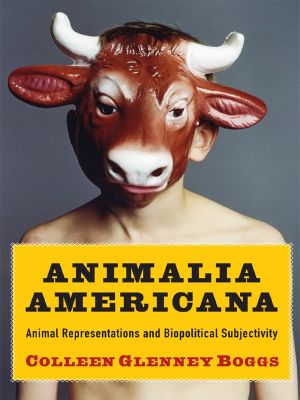Animalia Americana

- Authors
- Boggs, Colleen Glenney
- Publisher
- Columbia University Press
- Tags
- nat039000 , lit004020 , nature , animal rights , literary criticism , american , general
- ISBN
- 9780231531948
- Date
- 2013-01-08T00:00:00+00:00
- Size
- 17.11 MB
- Lang
- en
From the bestiality trials of the seventeenth-century Plymouth Plantation to the emergence of sentimental pet culture in the nineteenth, Boggs traces a history of human-animal sexuality in America, one shaped by sexualized animal bodies and affective pet relations. Boggs concentrates on the formative and disruptive presence of animals in the writings of Frederick Douglass, Edgar Allan Poe, and Emily Dickinson.
Consulting a diverse archive of literary texts, Colleen Glenney Boggs places animal representation at the center of the making of the liberal American subject. From the bestiality trials of the seventeenth-century Plymouth Plantation to the emergence of sentimental pet culture in the nineteenth, Boggs traces a history of human-animal sexuality in America, one shaped by sexualized animal bodies and affective pet relations. Boggs concentrates on the formative and disruptive presence of animals in the writings of Frederick Douglass, Edgar Allan Poe, and Emily Dickinson. Engaging with the critical theories of Michel Foucault, Giorgio Agamben, Judith Butler, Donna Haraway and others, she argues that animals are critical to the ways in which Americans enact their humanity and regulate subjects in the biopolitical state. Biopower, or a politics that extends its reach to life, thrives on the strategic ambivalence between who is considered human and what is judged as animal. It generates a space of indeterminacy where animal representations intervene to define and challenge the parameters of subjectivity. The renegotiation of the species line produces a tension that is never fully regulated. Therefore, as both figures of radical alterity and the embodiment of biopolitics, animals are simultaneously exceptional and exemplary to the biopolitical state. An original contribution to animal studies, American studies, critical race theory, and posthumanist inquiry, Boggs thrillingly reinterprets a long and highly contentious human-animal history.
Consulting a diverse archive of literary texts, Colleen Glenney Boggs places animal representation at the center of the making of the liberal American subject. From the bestiality trials of the seventeenth-century Plymouth Plantation to the emergence of sentimental pet culture in the nineteenth, Boggs traces a history of human-animal sexuality in America, one shaped by sexualized animal bodies and affective pet relations.
Boggs concentrates on the formative and disruptive presence of animals in the writings of Frederick Douglass, Edgar Allan Poe, and Emily Dickinson. Engaging with the critical theories of Michel Foucault, Giorgio Agamben, Judith Butler, Donna Haraway and others, she argues that animals are critical to the ways in which Americans enact their humanity and regulate subjects in the biopolitical state. Biopower, or a politics that extends its reach to life, thrives on the strategic ambivalence between who is considered human and what is judged as animal. It generates a space of indeterminacy where animal representations intervene to define and challenge the parameters of subjectivity. The renegotiation of the species line produces a tension that is never fully regulated. Therefore, as both figures of radical alterity and the embodiment of biopolitics, animals are simultaneously exceptional and exemplary to the biopolitical state. An original contribution to animal studies, American studies, critical race theory, and posthumanist inquiry, Boggs thrillingly reinterprets a long and highly contentious human-animal history.